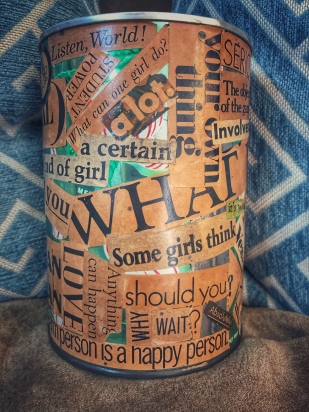
Can you see the McCarthy bumper sticker in the background? I couldn’t vote, but this “art” project was my manifesto.
On election day 1968, I had recently turned 20—too young to vote at the time. The voting age was not lowered to 18 until 1971. My vote in 1968 would have gone to Hubert Humphrey, although my preference had been the anti-war candidate, Eugene McCarthy. I remember my sadness as I watched election returns rolling in on the TV in the common room of my sorority house at Southern Methodist University. Just in case you’ve forgotten—Richard Nixon won in 1968.
I was assistant editor of the SMU student newspaper that year and, with my press credentials, I had attended a Nixon “speech” (read “rally”) inside our campus coliseum at which the chair of our Board of Regents had controversially served not just as host, but head cheerleader. Faculty members wearing buttons favoring the Democratic candidate were barred entry. We published an irate editorial about the matter. We had also editorialized on the need to lower the voting age to 18, arguing that if we were old enough to be drafted to fight a war in Vietnam, we ought to be allowed to vote.
By 1972 I was 24 and a duly registered voter. I backed the losing candidate, George McGovern. In 1976, when the Democrat Jimmy Carter actually won over Gerald Ford, my vote fell into the losing column again as I voted for Independent Eugene McCarthy. The next three elections went Republican, so I lost again. Long story short? Out of a total of twelve opportunities during my voting life, I’ve only voted for the winner of a presidential election four times—twice each for Bill Clinton and Barack Obama.
I’m hoping against hope to be in the winning column again this year as I cast my vote for Joe Biden. He wasn’t my first choice as candidate, but he is a good man and he will serve us well.
We ALL need to get out and vote this year, whether the “getting out” is depositing a ballot in a mailbox or showing up in person at a polling place on November 3.
Have you checked to verify your voter registration? Have you filled out the appropriate paperwork to vote by mail if you’re entitled to do that in your state? If you’re voting in person, do you know how to find your polling place? Do you know what ID materials (if any) you’ll need to carry with you? Do you know all the candidates and issues?
DO NOT be misled by memes you see on Facebook or Twitter—voting regulations vary by state and you need to make sure you know what the rules are where you live. Only rely on websites that provide official information for YOUR state, YOUR county, YOUR precinct!
Please vote! Please vote wisely and responsibly.
Win or lose, make your vote count!


